
LLMFarm
llama and other large language models on iOS and MacOS offline using GGML library.
Stars: 1521
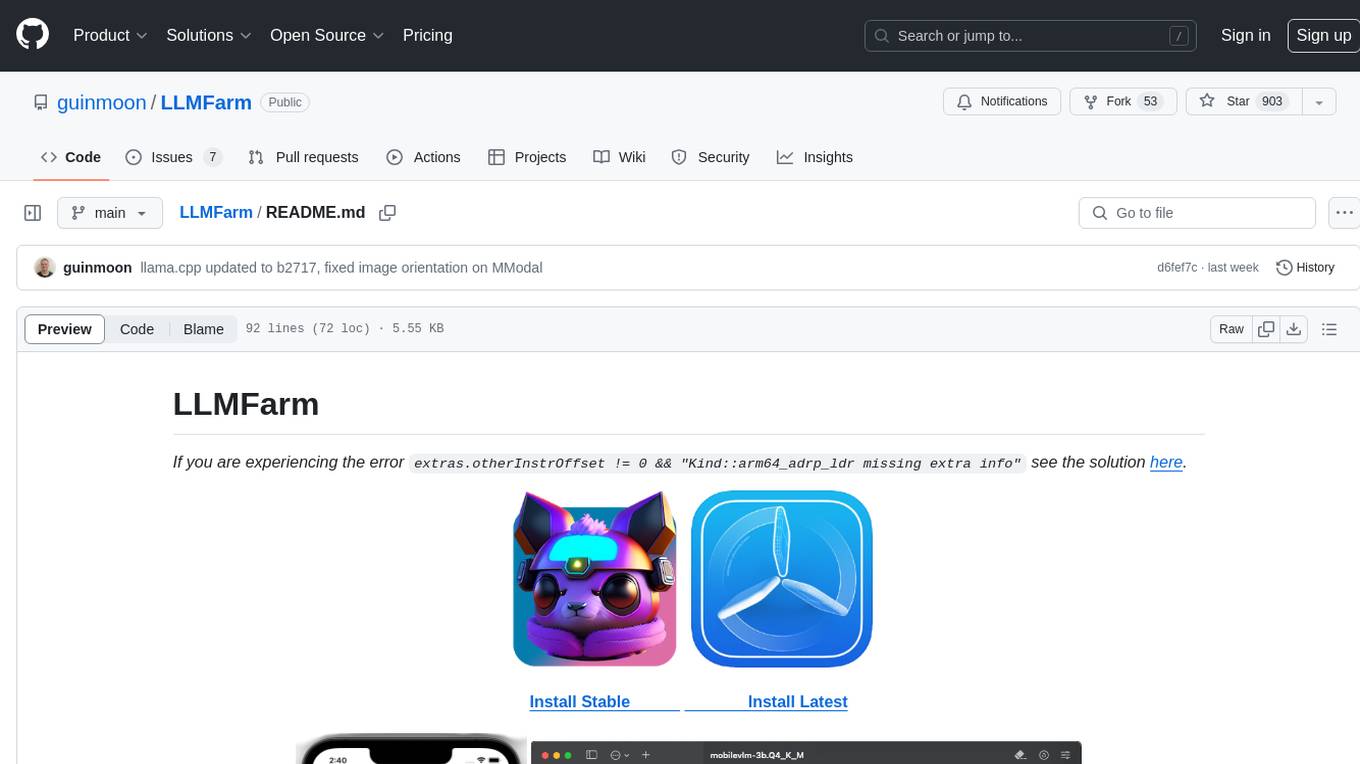
LLMFarm is an iOS and MacOS app designed to work with large language models (LLM). It allows users to load different LLMs with specific parameters, test the performance of various LLMs on iOS and macOS, and identify the most suitable model for their projects. The tool is based on ggml and llama.cpp by Georgi Gerganov and incorporates sources from rwkv.cpp by saharNooby, Mia by byroneverson, and LlamaChat by alexrozanski. LLMFarm features support for MacOS (13+) and iOS (16+), various inferences and sampling methods, Metal compatibility (not supported on Intel Mac), model setting templates, LoRA adapters support, LoRA finetune support, LoRA export as model support, and more. It also offers a range of inferences including LLaMA, GPTNeoX, Replit, GPT2, Starcoder, RWKV, Falcon, MPT, Bloom, and others. Additionally, it supports multimodal models like LLaVA, Obsidian, and MobileVLM. Users can customize inference options through JSON files and access supported models for download.
README:
LLMFarm is an iOS and MacOS app to work with large language models (LLM). It allows you to load different LLMs with certain parameters.With LLMFarm, you can test the performance of different LLMs on iOS and macOS and find the most suitable model for your project.
Based on ggml and llama.cpp by Georgi Gerganov.
- [x] MacOS (13+)
- [x] iOS (16+)
- [x] Various inferences
- [x] Various sampling methods
- [x] Metal (dont work on intel Mac)
- [x] Model setting templates
- [x] Restore context state
- [x] Apple Shortcuts
- [x] RAG
- [x]
 LLaMA
LLaMA
- [x]
 Gemma
Gemma
- [x]
 Phi
Phi
- [x]
 GPT2 + Cerebras
GPT2 + Cerebras
- [x]
 Starcoder(Santacoder)
Starcoder(Santacoder)
- [x]
 Falcon
Falcon
- [x]
 MPT
MPT
- [x]
 Bloom
Bloom
- [x]
 StableLM-3b-4e1t
StableLM-3b-4e1t
- [x]
 Qwen
Qwen
- [x]
 Yi models
Yi models
- [x]
 Deepseek models
Deepseek models
- [x]
 Mixtral MoE
Mixtral MoE
- [x]
 PLaMo-13B
PLaMo-13B
- [x]
 Mamba
Mamba
- [x]
 RWKV
RWKV
- [x]
 GPTNeoX
GPTNeoX
See full list here.
- [x] LLaVA 1.5 models, LLaVA 1.6 models
- [x] BakLLaVA
- [x] Obsidian
- [x] ShareGPT4V
- [x] MobileVLM 1.7B/3B models
- [x] Yi-VL
- [x] Moondream
Note: For Falcon, Alpaca, GPT4All, Chinese LLaMA / Alpaca and Chinese LLaMA-2 / Alpaca-2, Vigogne (French), Vicuna, Koala, OpenBuddy (Multilingual), Pygmalion/Metharme, WizardLM, Baichuan 1 & 2 + derivations, Aquila 1 & 2, Mistral AI v0.1, Refact, Persimmon 8B, MPT, Bloom select llama inference in model settings.
- [x] Temperature (temp, tok-k, top-p)
- [x] Tail Free Sampling (TFS)
- [x] Locally Typical Sampling
- [x] Mirostat
- [x] Greedy
- [x] Grammar
You can find answers to some questions in the FAQ section.
When creating a chat, a JSON file is generated in which you can specify additional inference options. The chat files are located in the "chats" directory. You can see all inference options here.
You can find some of the supported models here.
llmfarm_core has been moved to a separate repository. To build llmfarm, you need to clone this repository recursively:
git clone --recurse-submodules https://github.com/guinmoon/LLMFarmFor Tasks:
Click tags to check more tools for each tasksFor Jobs:
Alternative AI tools for LLMFarm
Similar Open Source Tools

LLMFarm
LLMFarm is an iOS and MacOS app designed to work with large language models (LLM). It allows users to load different LLMs with specific parameters, test the performance of various LLMs on iOS and macOS, and identify the most suitable model for their projects. The tool is based on ggml and llama.cpp by Georgi Gerganov and incorporates sources from rwkv.cpp by saharNooby, Mia by byroneverson, and LlamaChat by alexrozanski. LLMFarm features support for MacOS (13+) and iOS (16+), various inferences and sampling methods, Metal compatibility (not supported on Intel Mac), model setting templates, LoRA adapters support, LoRA finetune support, LoRA export as model support, and more. It also offers a range of inferences including LLaMA, GPTNeoX, Replit, GPT2, Starcoder, RWKV, Falcon, MPT, Bloom, and others. Additionally, it supports multimodal models like LLaVA, Obsidian, and MobileVLM. Users can customize inference options through JSON files and access supported models for download.
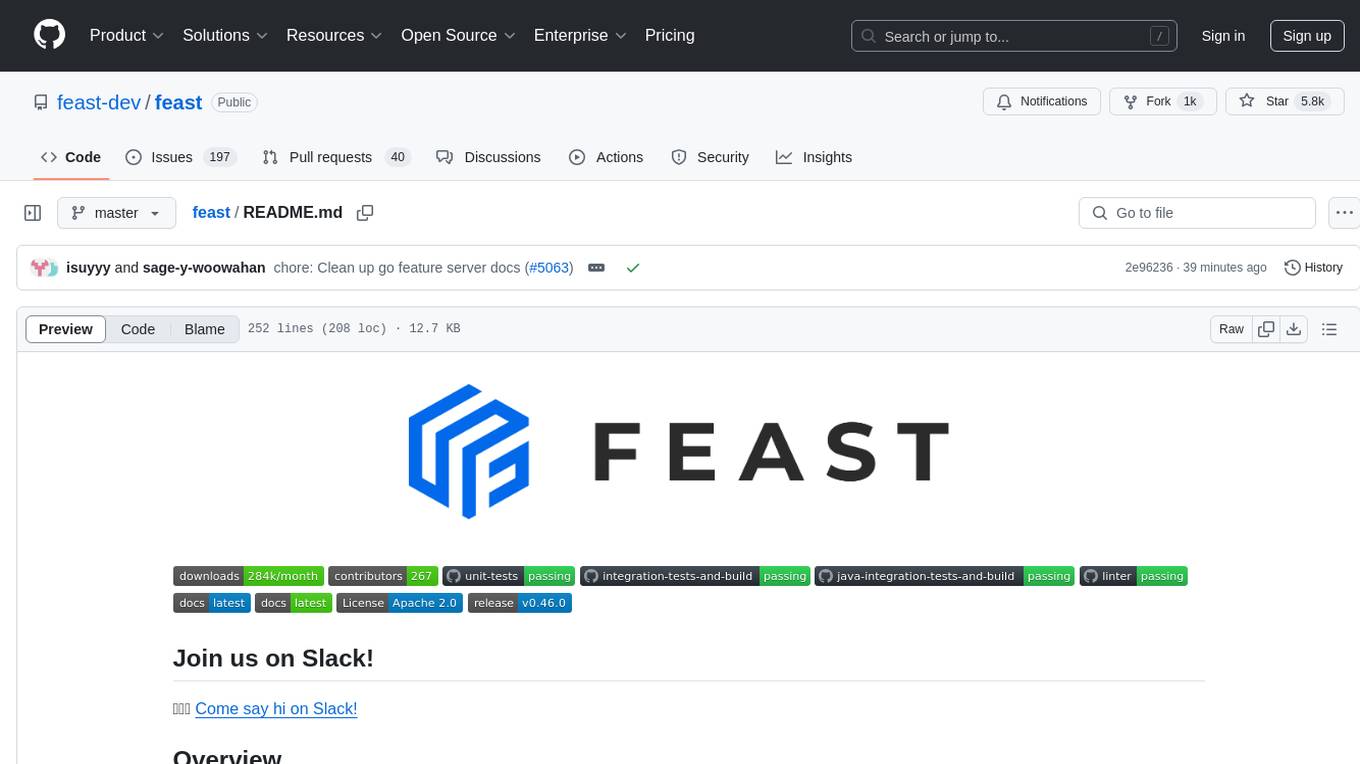
feast
Feast is an open source feature store for machine learning, providing a fast path to manage infrastructure for productionizing analytic data. It allows ML platform teams to make features consistently available, avoid data leakage, and decouple ML from data infrastructure. Feast abstracts feature storage from retrieval, ensuring portability across different model training and serving scenarios.
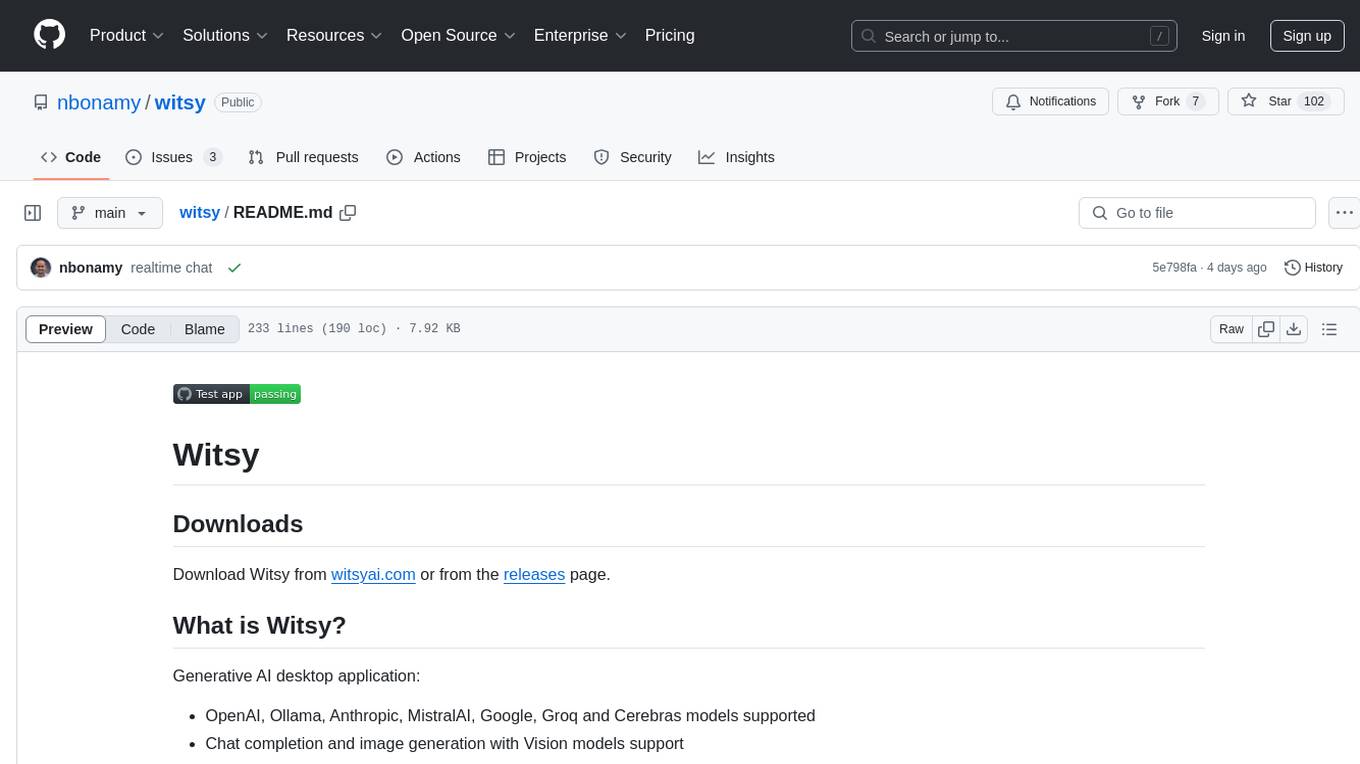
witsy
Witsy is a generative AI desktop application that supports various models like OpenAI, Ollama, Anthropic, MistralAI, Google, Groq, and Cerebras. It offers features such as chat completion, image generation, scratchpad for content creation, prompt anywhere functionality, AI commands for productivity, expert prompts for specialization, LLM plugins for additional functionalities, read aloud capabilities, chat with local files, transcription/dictation, Anthropic Computer Use support, local history of conversations, code formatting, image copy/download, and more. Users can interact with the application to generate content, boost productivity, and perform various AI-related tasks.
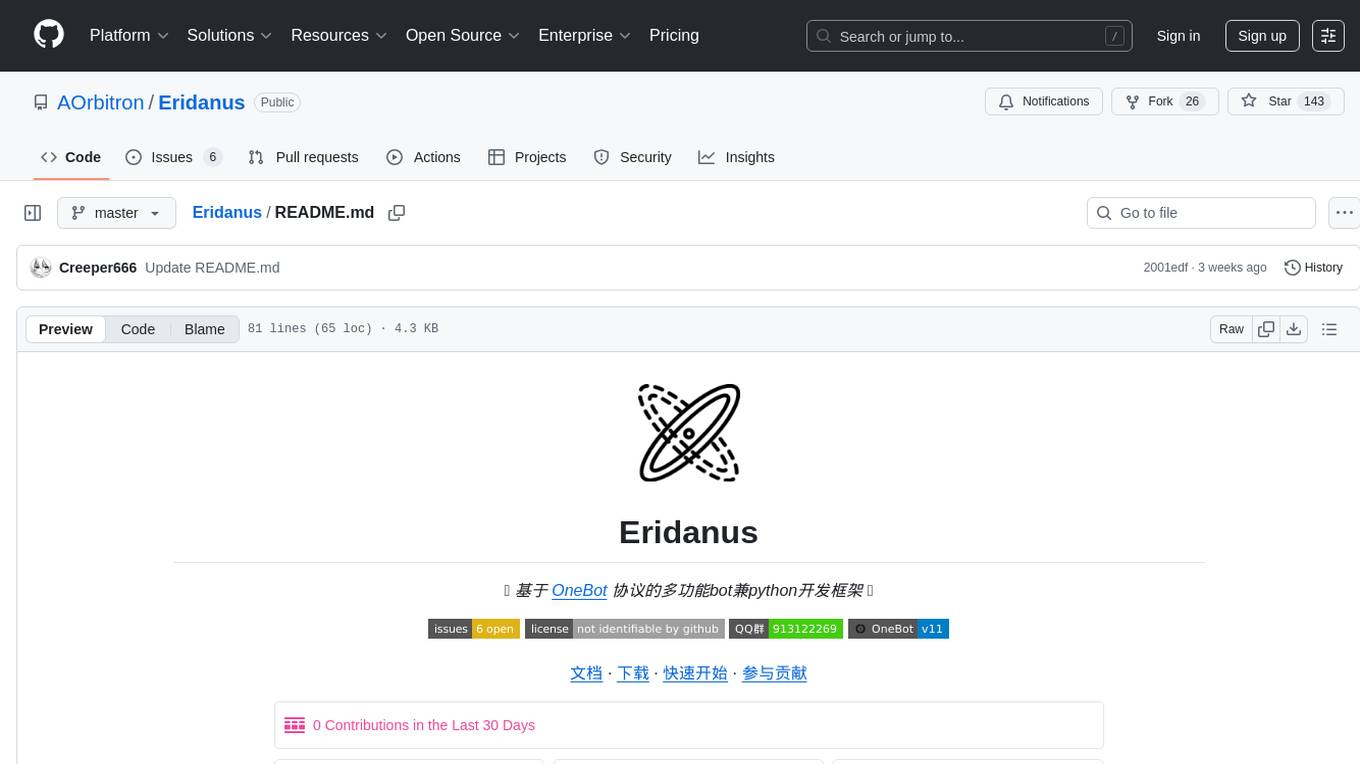
Eridanus
Eridanus is a powerful data visualization tool designed to help users create interactive and insightful visualizations from their datasets. With a user-friendly interface and a wide range of customization options, Eridanus makes it easy for users to explore and analyze their data in a meaningful way. Whether you are a data scientist, business analyst, or student, Eridanus provides the tools you need to communicate your findings effectively and make data-driven decisions.
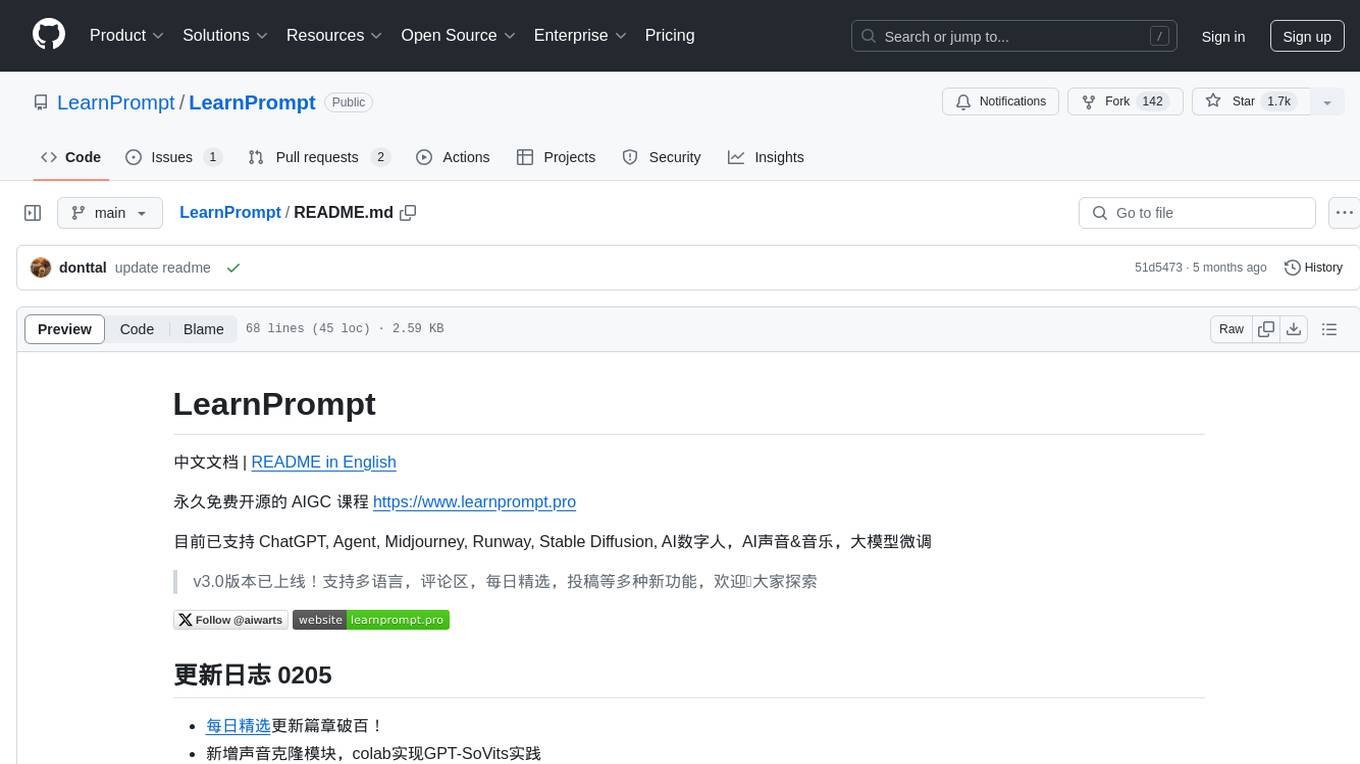
LearnPrompt
LearnPrompt is a permanent, free, open-source AIGC course platform that currently supports various tools like ChatGPT, Agent, Midjourney, Runway, Stable Diffusion, AI digital humans, AI voice & music, and large model fine-tuning. The platform offers features such as multilingual support, comment sections, daily selections, and submissions. Users can explore different modules, including sound cloning, RAG, GPT-SoVits, and OpenAI Sora world model. The platform aims to continuously update and provide tutorials, examples, and knowledge systems related to AI technologies.
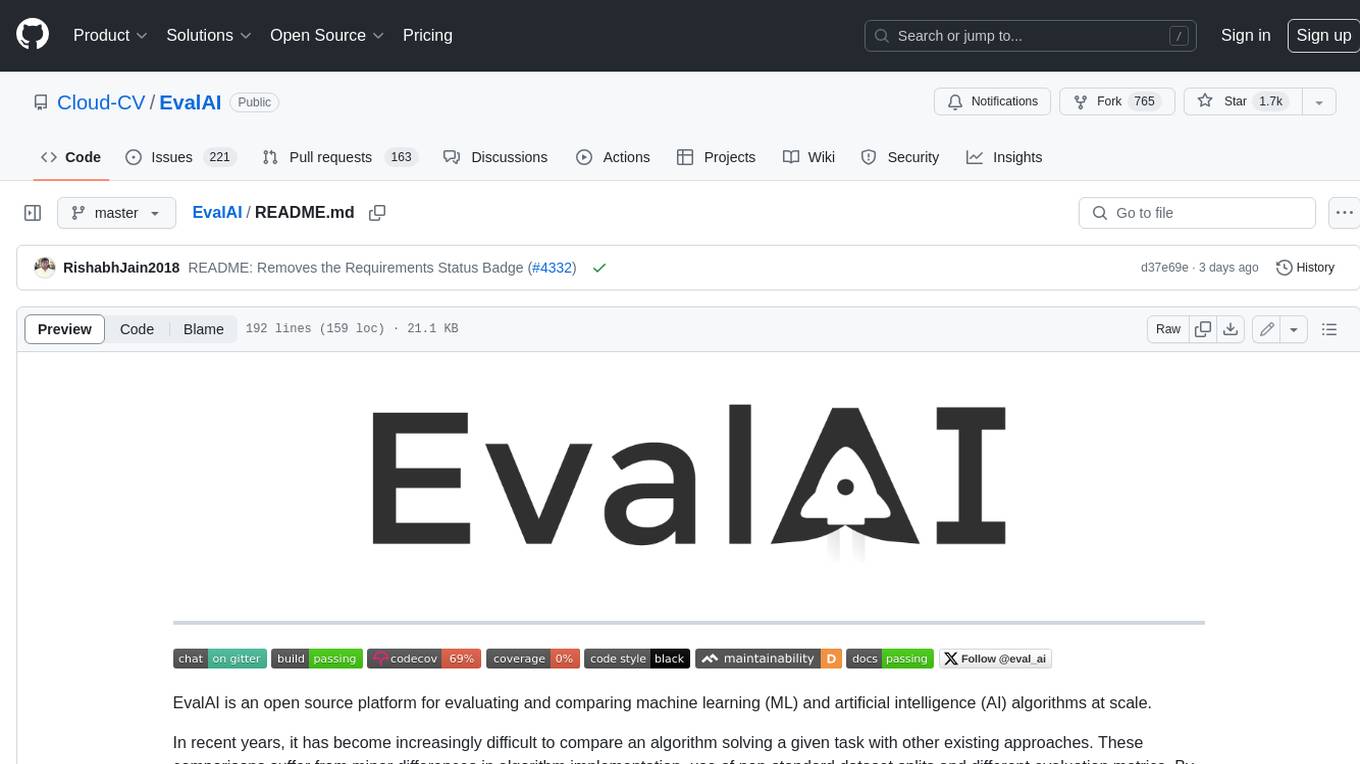
EvalAI
EvalAI is an open-source platform for evaluating and comparing machine learning (ML) and artificial intelligence (AI) algorithms at scale. It provides a central leaderboard and submission interface, making it easier for researchers to reproduce results mentioned in papers and perform reliable & accurate quantitative analysis. EvalAI also offers features such as custom evaluation protocols and phases, remote evaluation, evaluation inside environments, CLI support, portability, and faster evaluation.
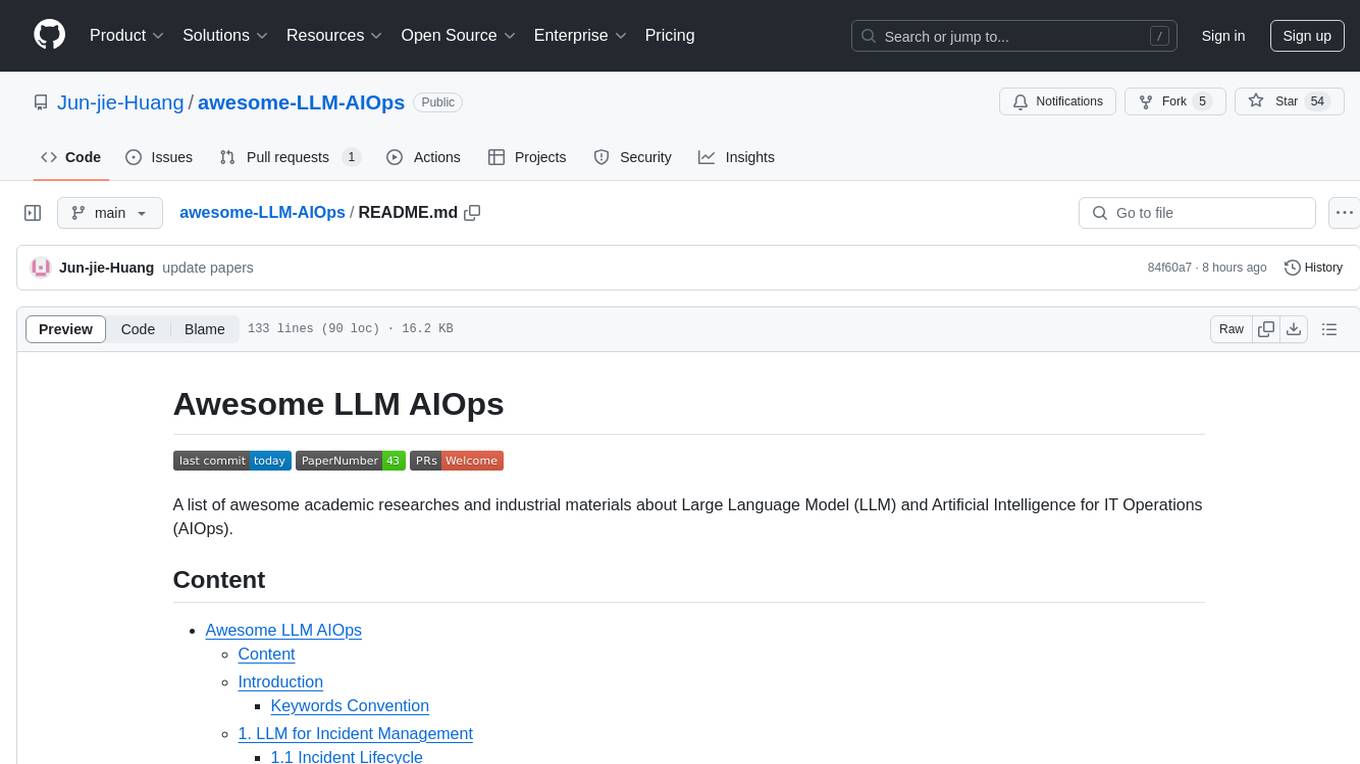
awesome-LLM-AIOps
The 'awesome-LLM-AIOps' repository is a curated list of academic research and industrial materials related to Large Language Models (LLM) and Artificial Intelligence for IT Operations (AIOps). It covers various topics such as incident management, log analysis, root cause analysis, incident mitigation, and incident postmortem analysis. The repository provides a comprehensive collection of papers, projects, and tools related to the application of LLM and AI in IT operations, offering valuable insights and resources for researchers and practitioners in the field.
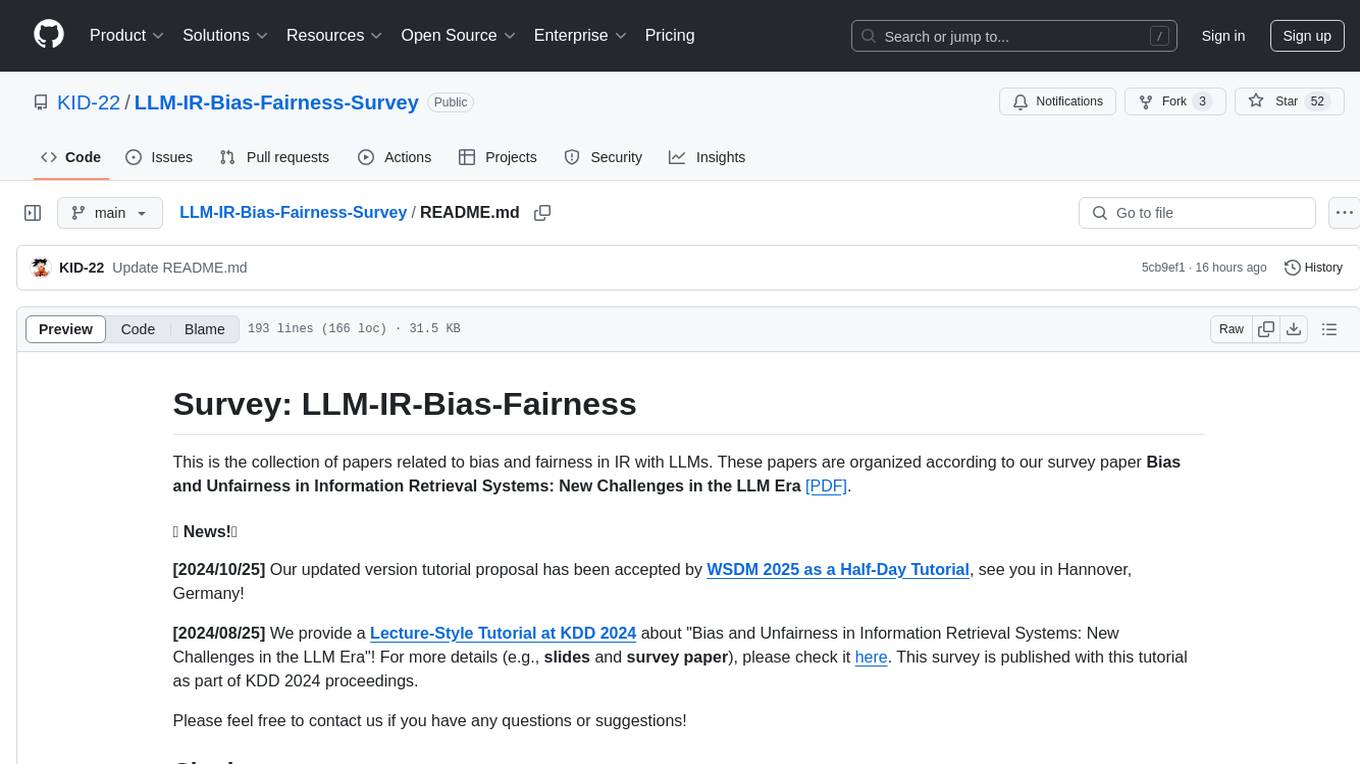
LLM-IR-Bias-Fairness-Survey
LLM-IR-Bias-Fairness-Survey is a collection of papers related to bias and fairness in Information Retrieval (IR) with Large Language Models (LLMs). The repository organizes papers according to a survey paper titled 'Bias and Unfairness in Information Retrieval Systems: New Challenges in the LLM Era'. The survey provides a comprehensive review of emerging issues related to bias and unfairness in the integration of LLMs into IR systems, categorizing mitigation strategies into data sampling and distribution reconstruction approaches.
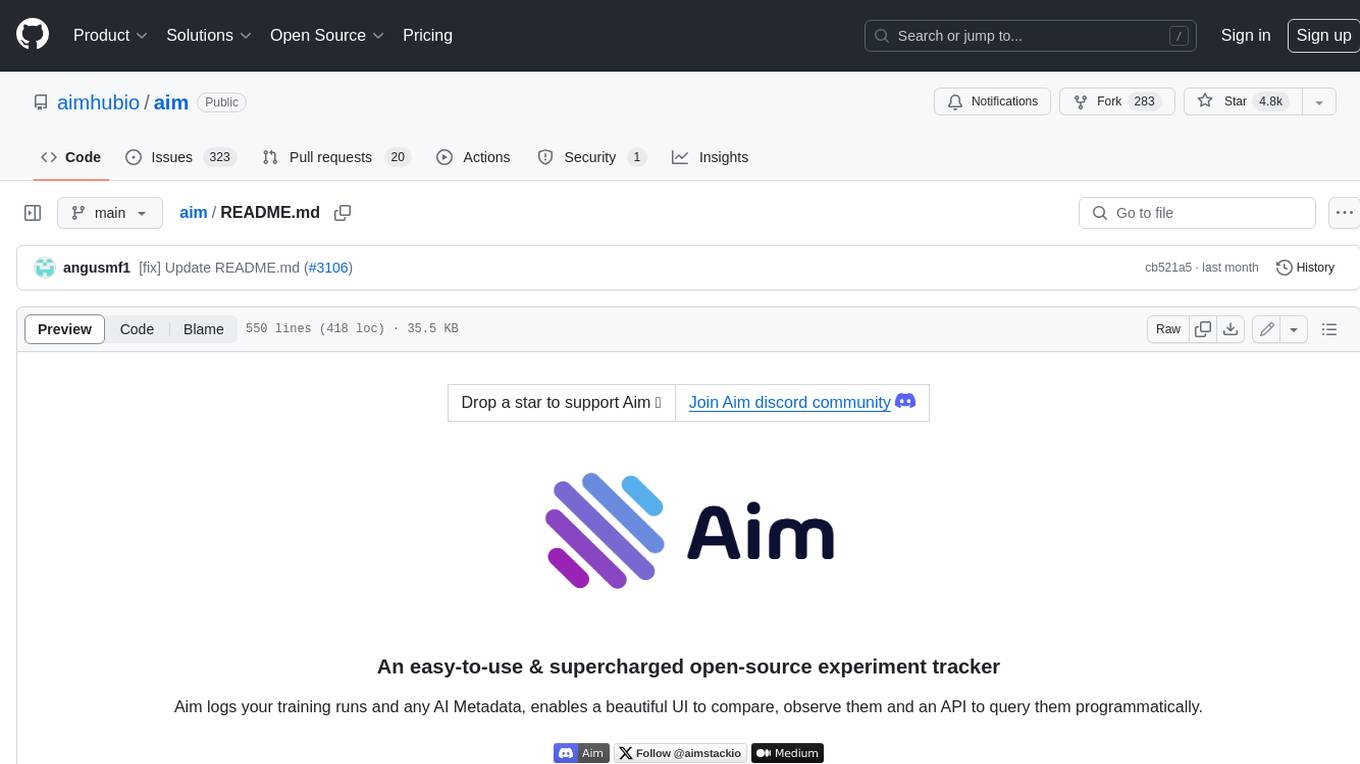
aim
Aim is an open-source, self-hosted ML experiment tracking tool designed to handle 10,000s of training runs. Aim provides a performant and beautiful UI for exploring and comparing training runs. Additionally, its SDK enables programmatic access to tracked metadata — perfect for automations and Jupyter Notebook analysis. **Aim's mission is to democratize AI dev tools 🎯**
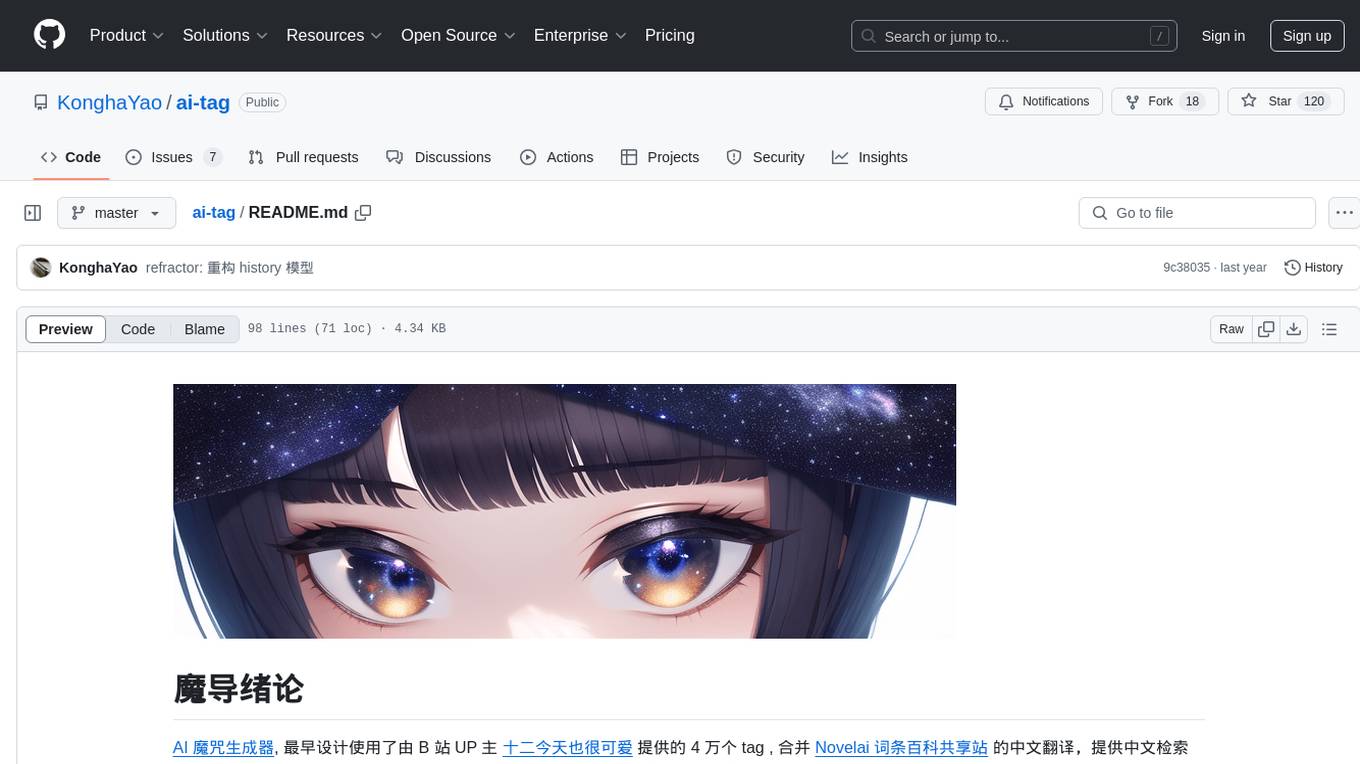
ai-tag
AI tag generator that combines 40,000 tags from Bilibili UP main Twelve Today is also very cute with Chinese translations from Novelai, providing Chinese search and tag generation services. It offers a tag community for magicians to directly copy and generate spells. Always free, no ads, no commercial use. The project includes a pure tag parsing library, independent spell parsing library, tag data repository, and a new gallery page with waterfall flow for viewing community images.
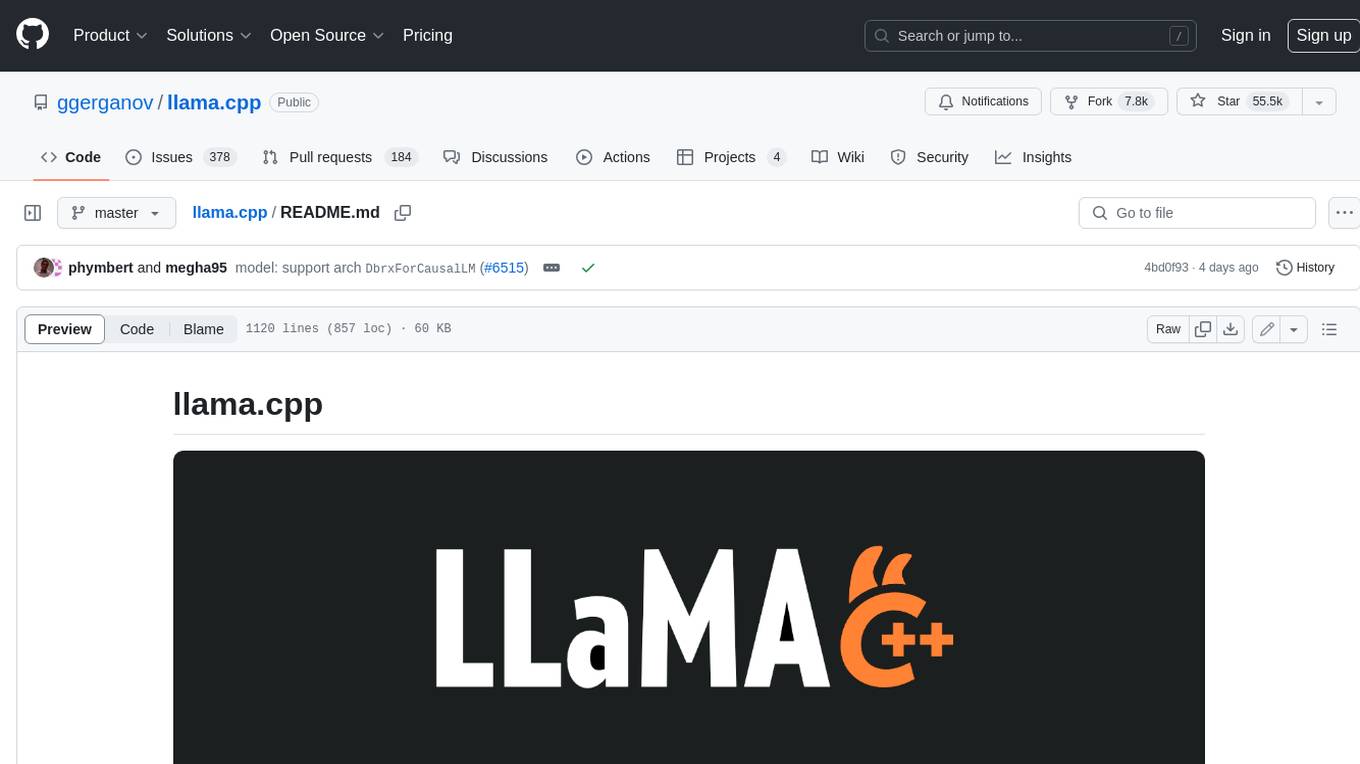
llama.cpp
llama.cpp is a C++ implementation of LLaMA, a large language model from Meta. It provides a command-line interface for inference and can be used for a variety of tasks, including text generation, translation, and question answering. llama.cpp is highly optimized for performance and can be run on a variety of hardware, including CPUs, GPUs, and TPUs.
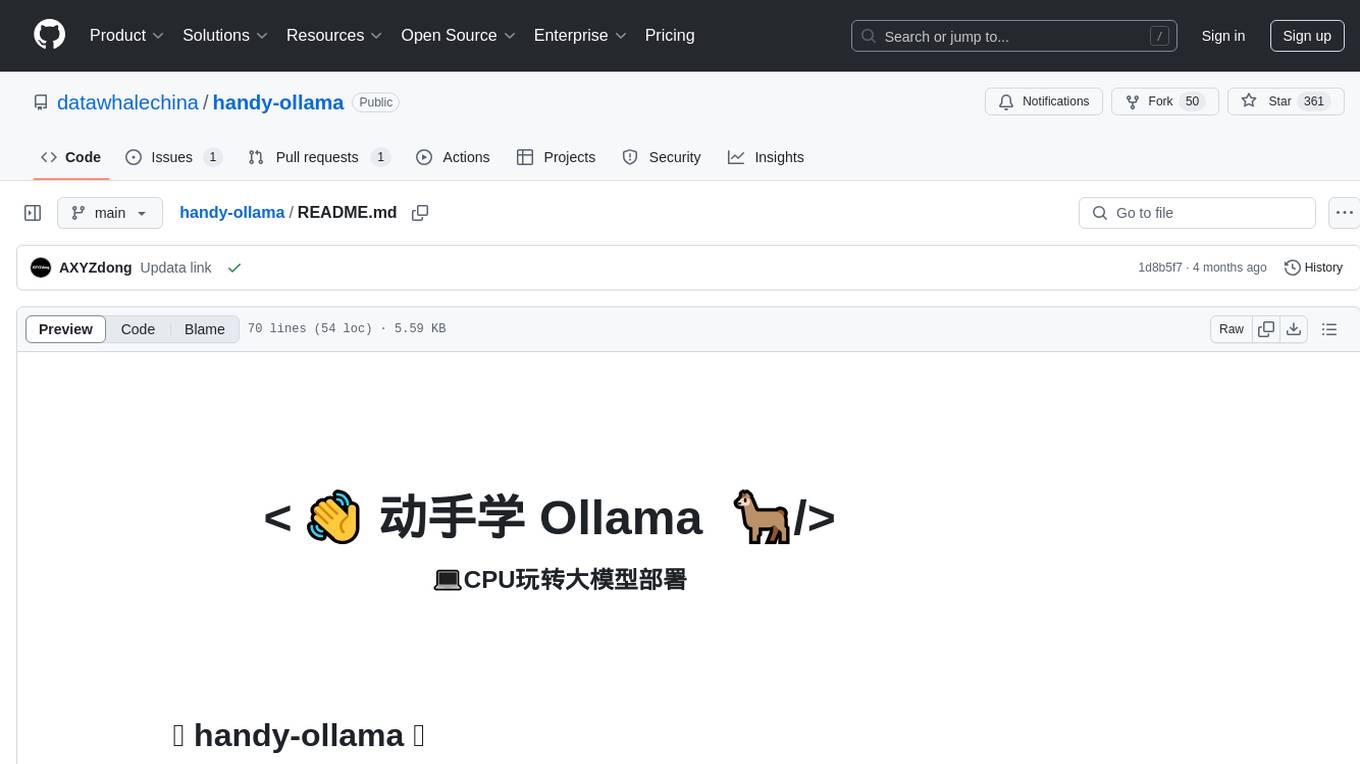
handy-ollama
Handy-Ollama is a tutorial for deploying Ollama with hands-on practice, making the deployment of large language models accessible to everyone. The tutorial covers a wide range of content from basic to advanced usage, providing clear steps and practical tips for beginners and experienced developers to learn Ollama from scratch, deploy large models locally, and develop related applications. It aims to enable users to run large models on consumer-grade hardware, deploy models locally, and manage models securely and reliably.
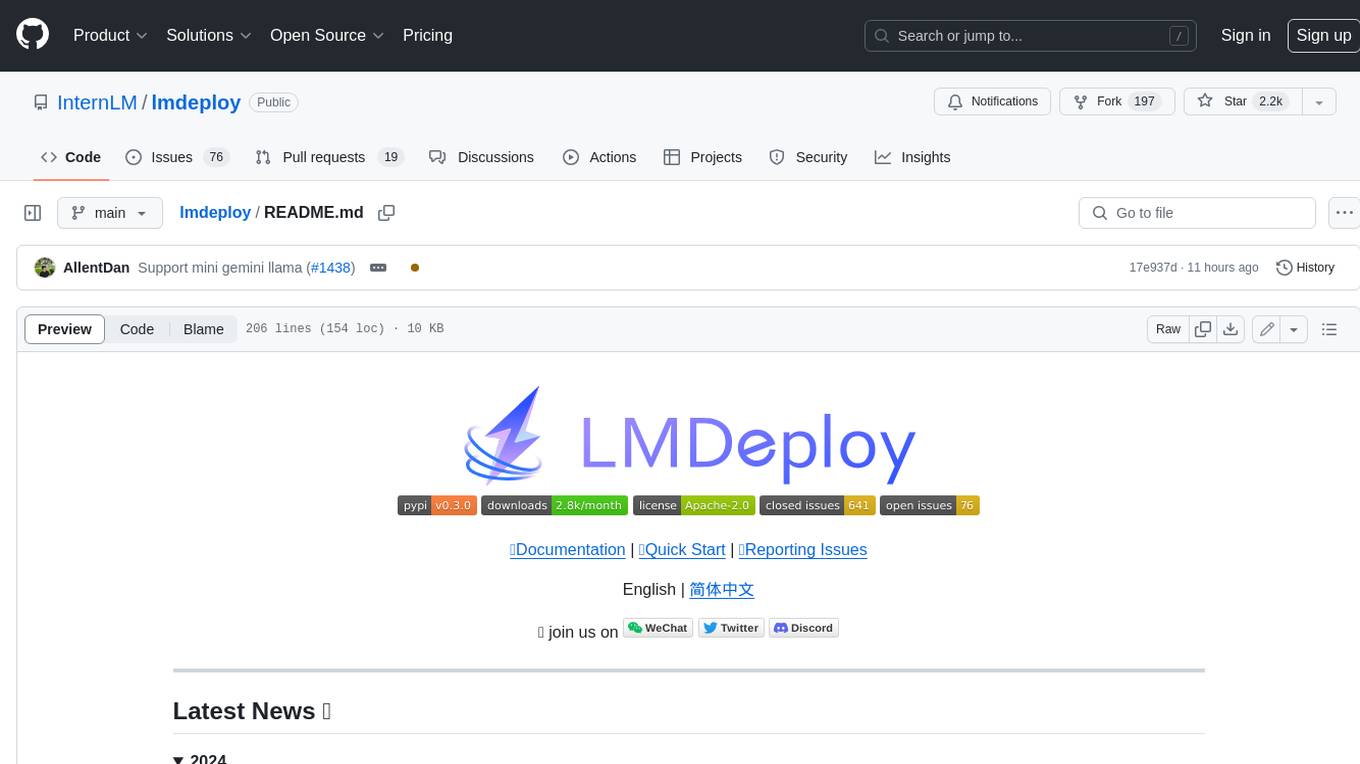
lmdeploy
LMDeploy is a toolkit for compressing, deploying, and serving LLM, developed by the MMRazor and MMDeploy teams. It has the following core features: * **Efficient Inference** : LMDeploy delivers up to 1.8x higher request throughput than vLLM, by introducing key features like persistent batch(a.k.a. continuous batching), blocked KV cache, dynamic split&fuse, tensor parallelism, high-performance CUDA kernels and so on. * **Effective Quantization** : LMDeploy supports weight-only and k/v quantization, and the 4-bit inference performance is 2.4x higher than FP16. The quantization quality has been confirmed via OpenCompass evaluation. * **Effortless Distribution Server** : Leveraging the request distribution service, LMDeploy facilitates an easy and efficient deployment of multi-model services across multiple machines and cards. * **Interactive Inference Mode** : By caching the k/v of attention during multi-round dialogue processes, the engine remembers dialogue history, thus avoiding repetitive processing of historical sessions.
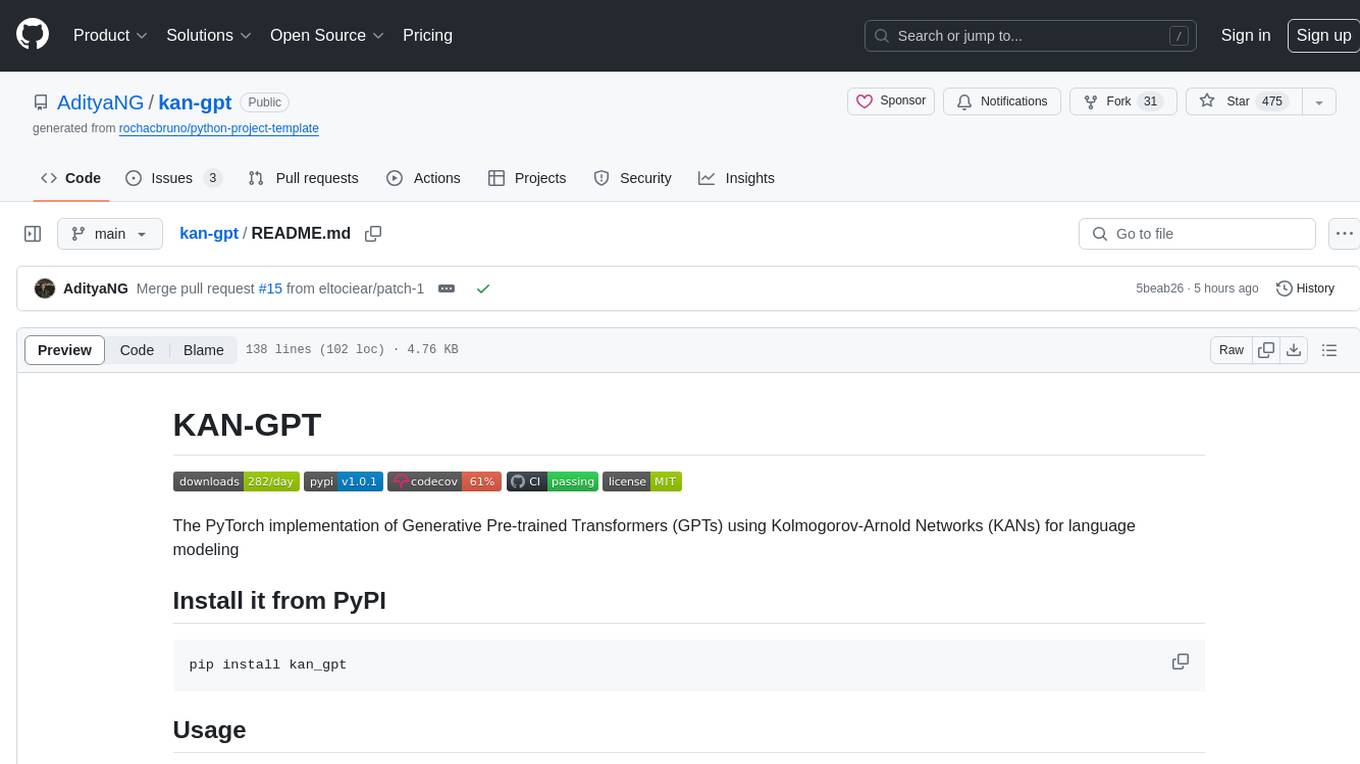
kan-gpt
The KAN-GPT repository is a PyTorch implementation of Generative Pre-trained Transformers (GPTs) using Kolmogorov-Arnold Networks (KANs) for language modeling. It provides a model for generating text based on prompts, with a focus on improving performance compared to traditional MLP-GPT models. The repository includes scripts for training the model, downloading datasets, and evaluating model performance. Development tasks include integrating with other libraries, testing, and documentation.
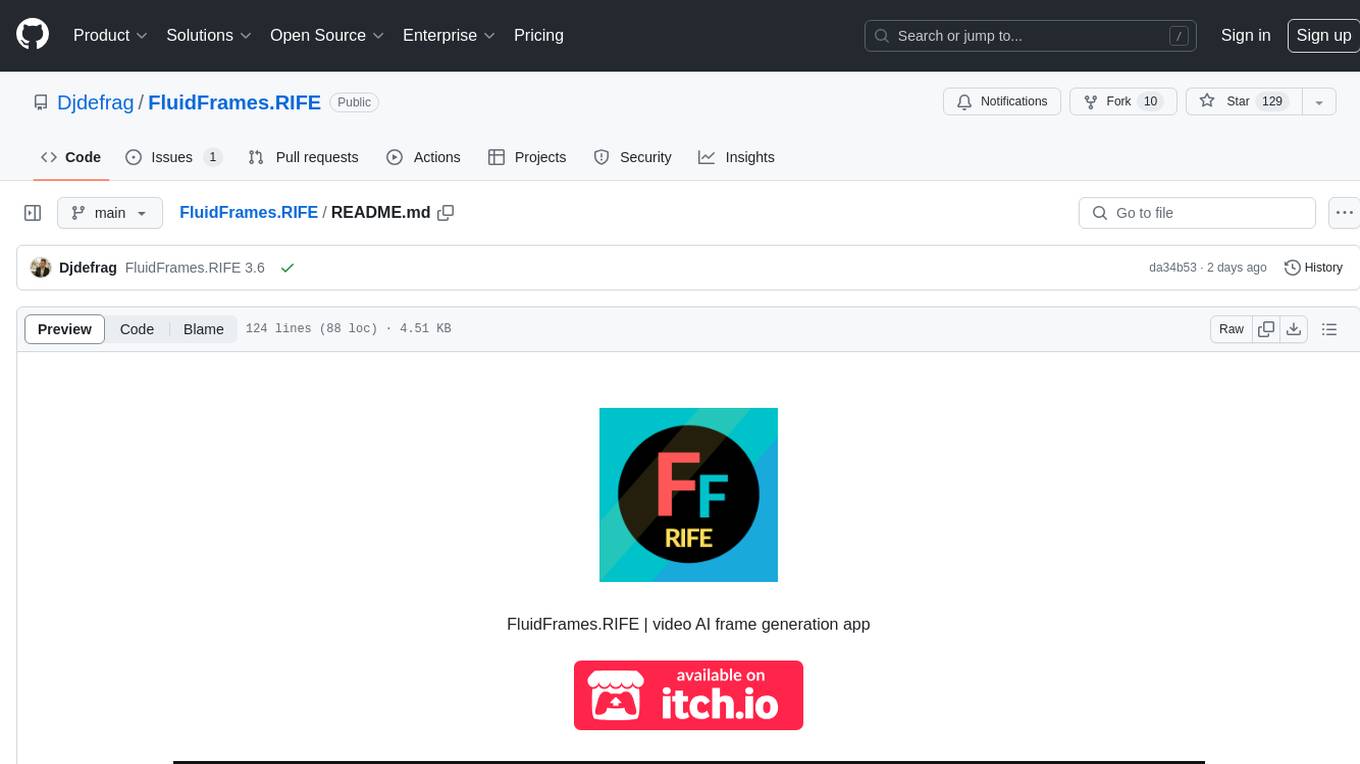
FluidFrames.RIFE
FluidFrames.RIFE is a Windows app powered by RIFE AI to create frame-generated and slowmotion videos. It is written in Python and utilizes external packages such as torch, onnxruntime-directml, customtkinter, OpenCV, moviepy, and Nuitka. The app features an elegant GUI, video frame generation at different speeds, video slow motion, video resizing, multiple GPU support, and compatibility with various video formats. Future versions aim to support different GPU types, enhance the GUI, include audio processing, optimize video processing speed, and introduce new features like saving AI-generated frames and supporting different RIFE AI models.
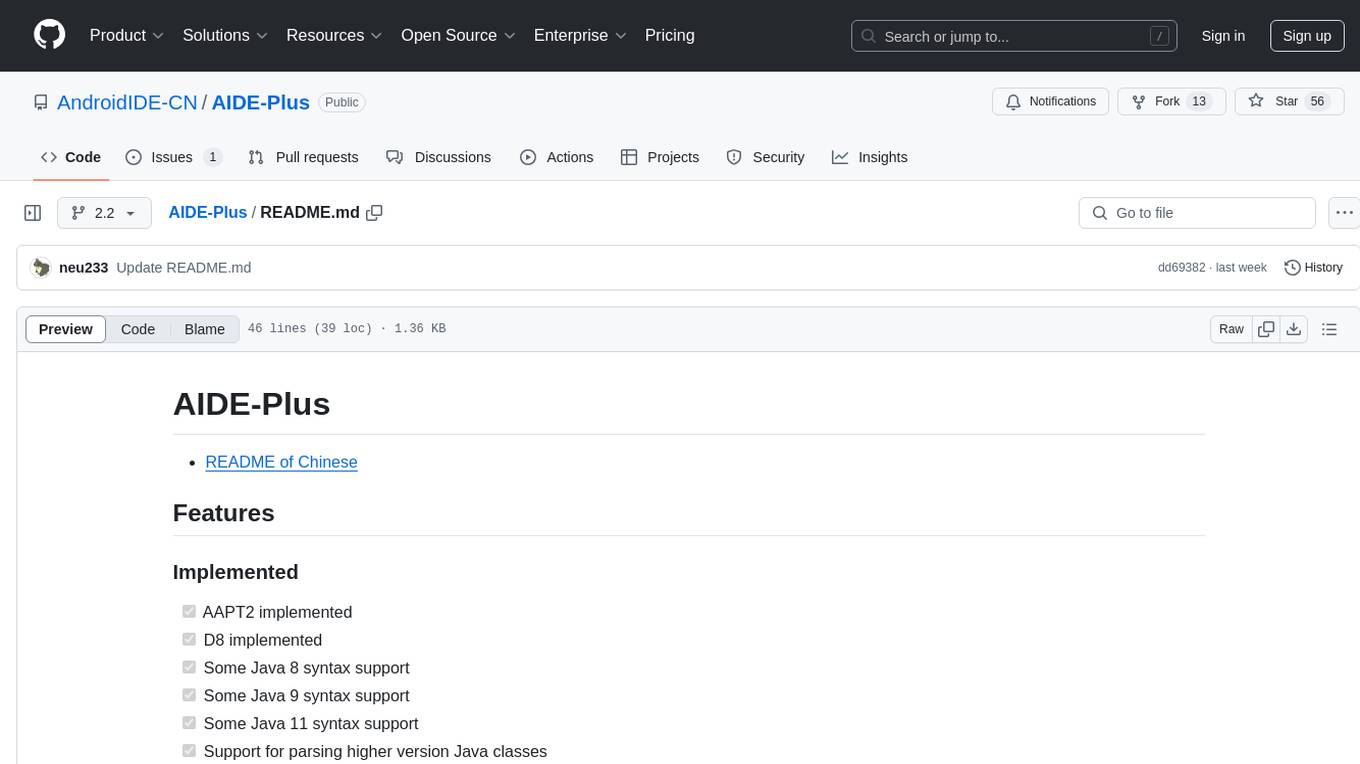
AIDE-Plus
AIDE-Plus is a comprehensive tool for Android app development, offering support for various Java syntax versions, Gradle and Maven build systems, ProGuard, AndroidX, CMake builds, APK/AAB generation, code coloring customization, data binding, and APK signing. It also provides features like AAPT2, D8, runtimeOnly, compileOnly, libgdxNatives, manifest merging, Shizuku installation support, and syntax auto-completion. The tool aims to streamline the development process and enhance the user experience by addressing common issues and providing advanced functionalities.
For similar tasks

LLMFarm
LLMFarm is an iOS and MacOS app designed to work with large language models (LLM). It allows users to load different LLMs with specific parameters, test the performance of various LLMs on iOS and macOS, and identify the most suitable model for their projects. The tool is based on ggml and llama.cpp by Georgi Gerganov and incorporates sources from rwkv.cpp by saharNooby, Mia by byroneverson, and LlamaChat by alexrozanski. LLMFarm features support for MacOS (13+) and iOS (16+), various inferences and sampling methods, Metal compatibility (not supported on Intel Mac), model setting templates, LoRA adapters support, LoRA finetune support, LoRA export as model support, and more. It also offers a range of inferences including LLaMA, GPTNeoX, Replit, GPT2, Starcoder, RWKV, Falcon, MPT, Bloom, and others. Additionally, it supports multimodal models like LLaVA, Obsidian, and MobileVLM. Users can customize inference options through JSON files and access supported models for download.
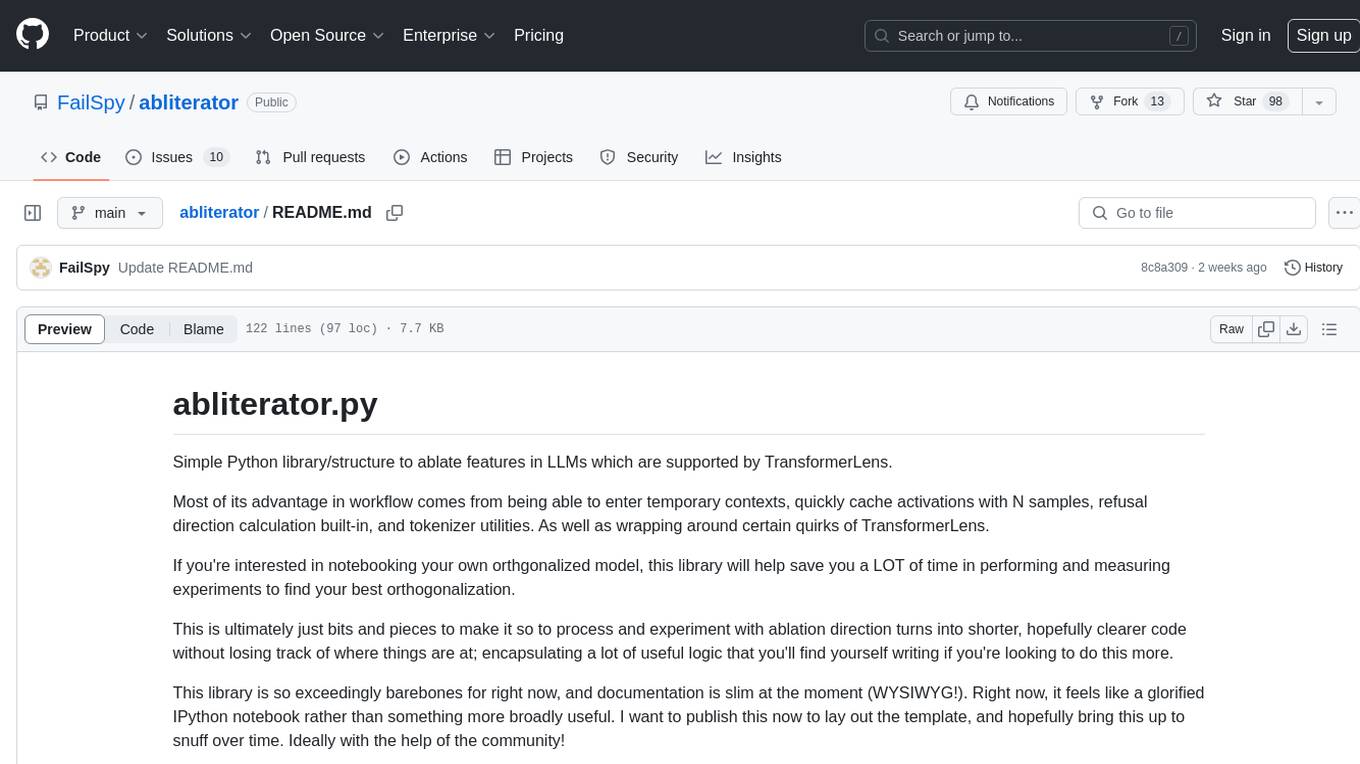
abliterator
abliterator.py is a simple Python library/structure designed to ablate features in large language models (LLMs) supported by TransformerLens. It provides capabilities to enter temporary contexts, cache activations with N samples, calculate refusal directions, and includes tokenizer utilities. The library aims to streamline the process of experimenting with ablation direction turns by encapsulating useful logic and minimizing code complexity. While currently basic and lacking comprehensive documentation, the library serves well for personal workflows and aims to expand beyond feature ablation to augmentation and additional features over time with community support.
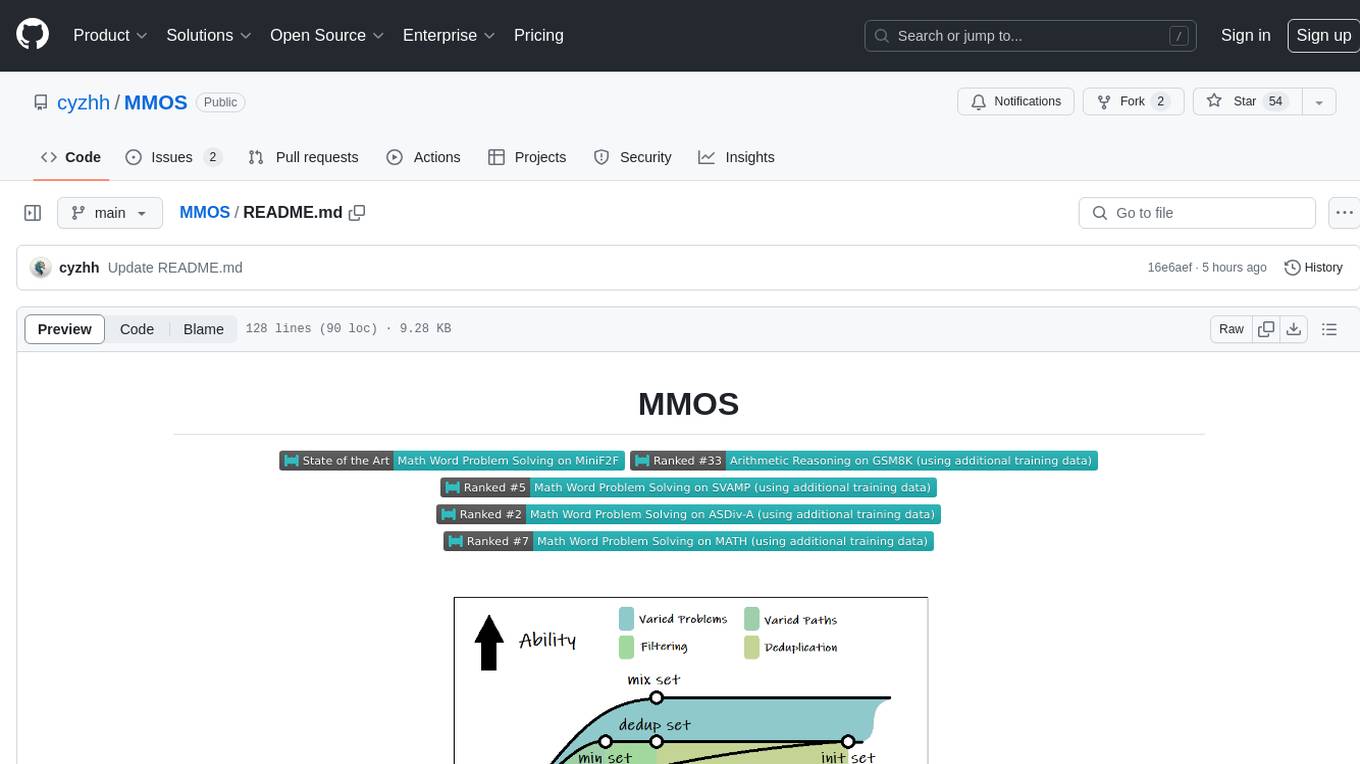
MMOS
MMOS (Mix of Minimal Optimal Sets) is a dataset designed for math reasoning tasks, offering higher performance and lower construction costs. It includes various models and data subsets for tasks like arithmetic reasoning and math word problem solving. The dataset is used to identify minimal optimal sets through reasoning paths and statistical analysis, with a focus on QA-pairs generated from open-source datasets. MMOS also provides an auto problem generator for testing model robustness and scripts for training and inference.
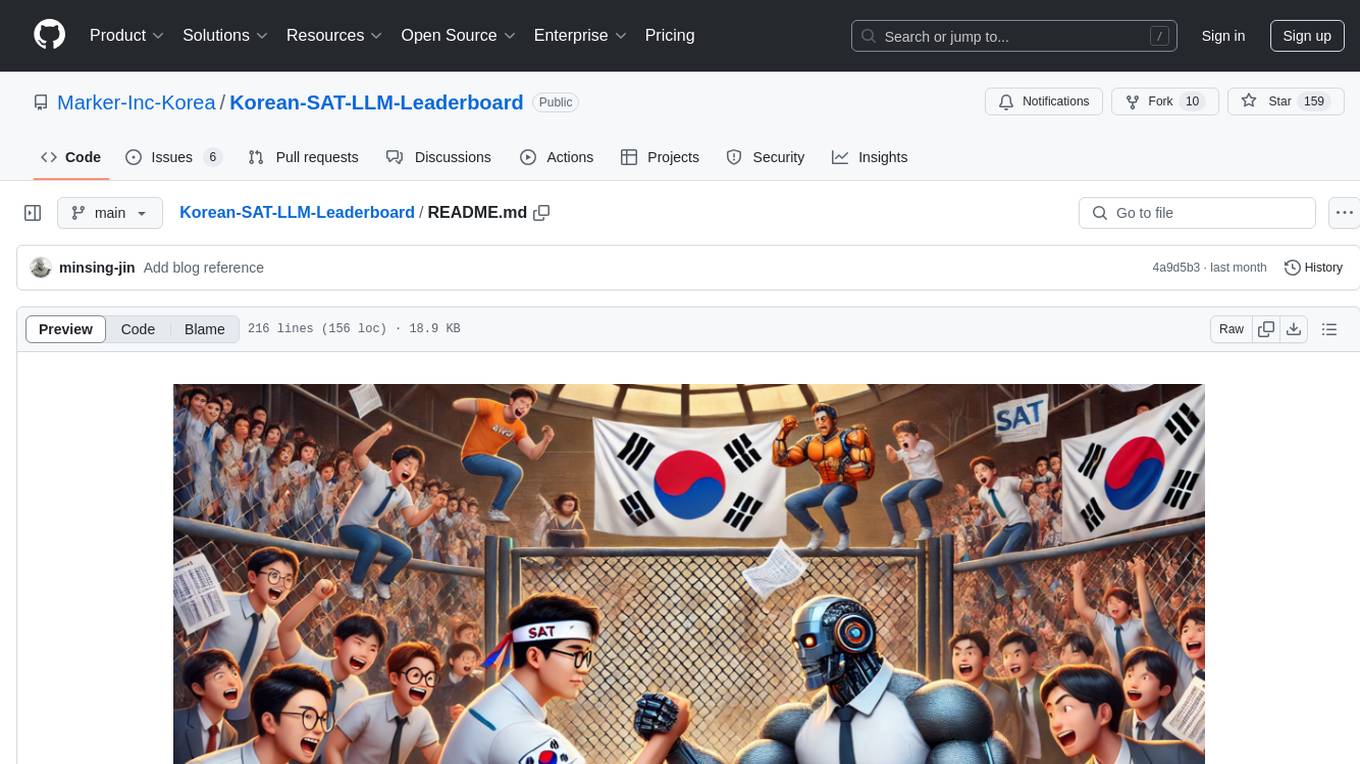
Korean-SAT-LLM-Leaderboard
The Korean SAT LLM Leaderboard is a benchmarking project that allows users to test their fine-tuned Korean language models on a 10-year dataset of the Korean College Scholastic Ability Test (CSAT). The project provides a platform to compare human academic ability with the performance of large language models (LLMs) on various question types to assess reading comprehension, critical thinking, and sentence interpretation skills. It aims to share benchmark data, utilize a reliable evaluation dataset curated by the Korea Institute for Curriculum and Evaluation, provide annual updates to prevent data leakage, and promote open-source LLM advancement for achieving top-tier performance on the Korean CSAT.
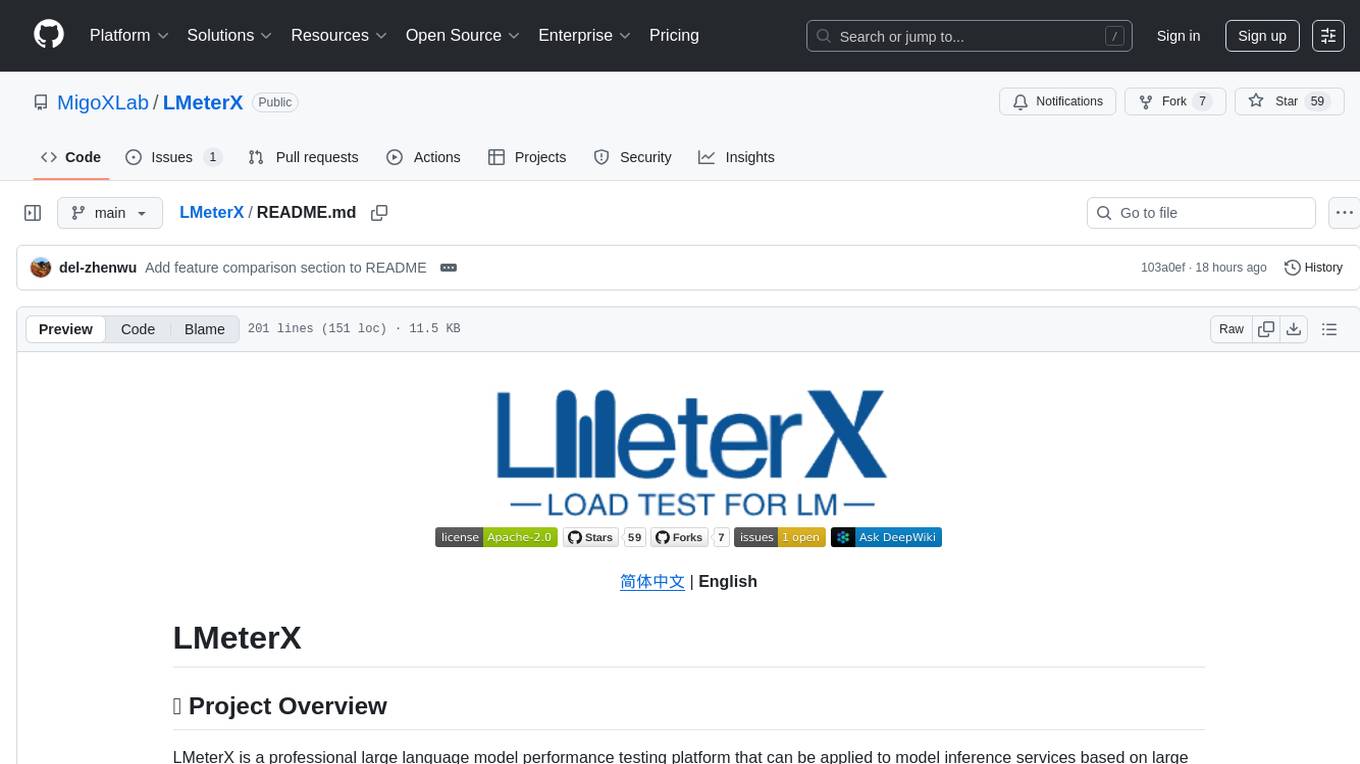
LMeterX
LMeterX is a professional large language model performance testing platform that supports model inference services based on large model inference frameworks and cloud services. It provides an intuitive Web interface for creating and managing test tasks, monitoring testing processes, and obtaining detailed performance analysis reports to support model deployment and optimization.
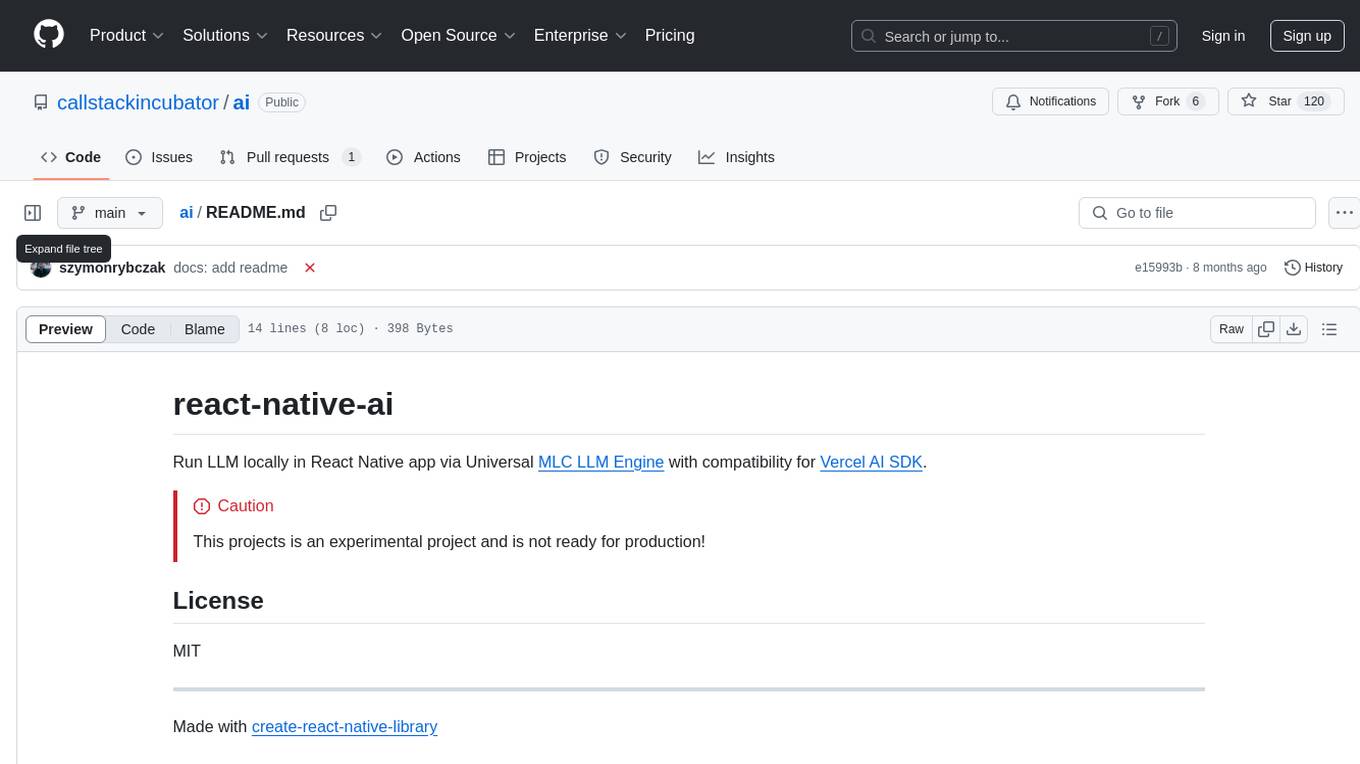
ai
The react-native-ai repository allows users to run Large Language Models (LLM) locally in a React Native app using the Universal MLC LLM Engine with compatibility for Vercel AI SDK. Please note that this project is experimental and not ready for production. The repository is licensed under MIT and was created with create-react-native-library.
For similar jobs

weave
Weave is a toolkit for developing Generative AI applications, built by Weights & Biases. With Weave, you can log and debug language model inputs, outputs, and traces; build rigorous, apples-to-apples evaluations for language model use cases; and organize all the information generated across the LLM workflow, from experimentation to evaluations to production. Weave aims to bring rigor, best-practices, and composability to the inherently experimental process of developing Generative AI software, without introducing cognitive overhead.

LLMStack
LLMStack is a no-code platform for building generative AI agents, workflows, and chatbots. It allows users to connect their own data, internal tools, and GPT-powered models without any coding experience. LLMStack can be deployed to the cloud or on-premise and can be accessed via HTTP API or triggered from Slack or Discord.

VisionCraft
The VisionCraft API is a free API for using over 100 different AI models. From images to sound.

kaito
Kaito is an operator that automates the AI/ML inference model deployment in a Kubernetes cluster. It manages large model files using container images, avoids tuning deployment parameters to fit GPU hardware by providing preset configurations, auto-provisions GPU nodes based on model requirements, and hosts large model images in the public Microsoft Container Registry (MCR) if the license allows. Using Kaito, the workflow of onboarding large AI inference models in Kubernetes is largely simplified.

PyRIT
PyRIT is an open access automation framework designed to empower security professionals and ML engineers to red team foundation models and their applications. It automates AI Red Teaming tasks to allow operators to focus on more complicated and time-consuming tasks and can also identify security harms such as misuse (e.g., malware generation, jailbreaking), and privacy harms (e.g., identity theft). The goal is to allow researchers to have a baseline of how well their model and entire inference pipeline is doing against different harm categories and to be able to compare that baseline to future iterations of their model. This allows them to have empirical data on how well their model is doing today, and detect any degradation of performance based on future improvements.

tabby
Tabby is a self-hosted AI coding assistant, offering an open-source and on-premises alternative to GitHub Copilot. It boasts several key features: * Self-contained, with no need for a DBMS or cloud service. * OpenAPI interface, easy to integrate with existing infrastructure (e.g Cloud IDE). * Supports consumer-grade GPUs.

spear
SPEAR (Simulator for Photorealistic Embodied AI Research) is a powerful tool for training embodied agents. It features 300 unique virtual indoor environments with 2,566 unique rooms and 17,234 unique objects that can be manipulated individually. Each environment is designed by a professional artist and features detailed geometry, photorealistic materials, and a unique floor plan and object layout. SPEAR is implemented as Unreal Engine assets and provides an OpenAI Gym interface for interacting with the environments via Python.

Magick
Magick is a groundbreaking visual AIDE (Artificial Intelligence Development Environment) for no-code data pipelines and multimodal agents. Magick can connect to other services and comes with nodes and templates well-suited for intelligent agents, chatbots, complex reasoning systems and realistic characters.



